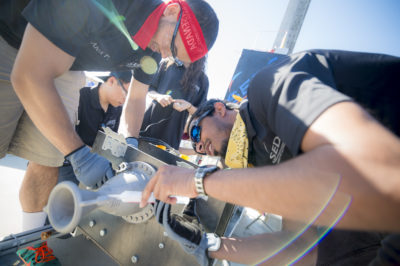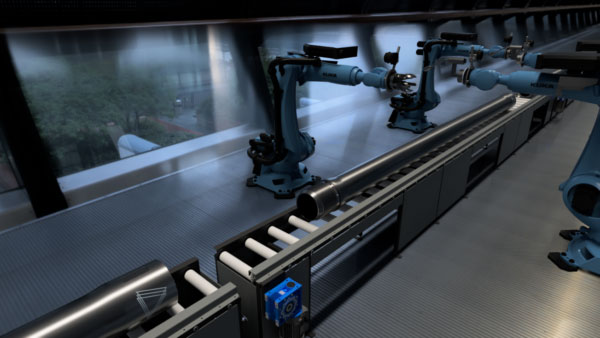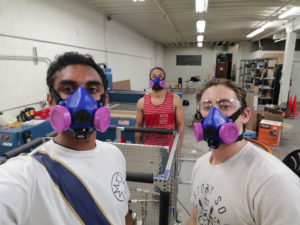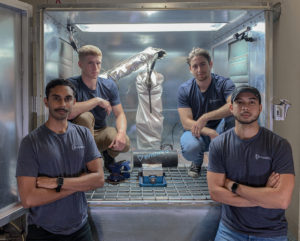
UC San Diego Alumni Build Fundamental Infrastructure for the 21st Century & Beyond
September 22, 2021
Unlocking new ways of manufacturing our world’s most valuable infrastructures, Tri-D Dynamics - now acquired by Titomic - continues to redefine what’s possible for metal 3D printing
 Tackling important problems with game changing technologies, Tri-D Dynamics is using proprietary manufacturing technology and 3D printing honed from rocket development to build smart pipelines that provide greater safety, efficiency, and sustainability. Tri-D Dynamics was born from the ambition of a small group of students at UC San Diego to challenge what was possible.
Tackling important problems with game changing technologies, Tri-D Dynamics is using proprietary manufacturing technology and 3D printing honed from rocket development to build smart pipelines that provide greater safety, efficiency, and sustainability. Tri-D Dynamics was born from the ambition of a small group of students at UC San Diego to challenge what was possible.
In 2011, Tri-D CEO and co-founder, Deepak Atyam, founded a small student team that would become the first university group in the world to 3D print a rocket engine and fly it. At their core, Tri-D Dynamics mission is to upgrade the world's pipeline infrastructure with the proper capabilities to drive our economies towards true sustainability.
This summer, they were acquired by Titomic, another milestone in their Triton entrepreneurial journey, where they’ll be continuing to redefine what’s possible for large scale metal manufacturing and 3D printing across all major industries. We caught up with Co-Founder Jesse Lang to learn how Tri-D is envisioning a world where humans are no longer needed to be placed in harm's way to produce our world's resources.
What excites you about your work?
The work that got us started and held true has been exploring manufacturing technologies that unlock new abilities to create products. With the Students for the Exploration and Development of Space (SEDS) lab at UC San Diego, we were chasing new 3-D printing technologies to create rocket engines. It had never really been done; we were able to take a new approach. We even created new ways of designing rocket engine features, now used by our NASA affiliates.
“We gravitated towards doing novel things because of newer generations of technologies and manufacturing capabilities. I love that we are designing things today that weren’t possible yesterday.”
We had no heritage in traditional design, and so we could leverage this naivety to come up with outside-the-box solutions. Students have a lot of power. While other companies were pursuing it, we were the guinea pigs to do the R&D safely. We gravitated towards doing novel things because of newer generations of technologies and manufacturing capabilities. I love that we are designing for tomorrow what seems impossible today.
How did you first get involved with The Basement & the UC San Diego entrepreneurial community?
I first got involved through the Gordon Scholars Program at the Jacobs School of Engineering, the resources and support were never ending. To me, leadership can be synonymous with entrepreneurship. Prior to our time at The Basement, we were working out of the now defunct Moxi Center - it was a little bit of the Wild West.
The Basement really allowed us to meet other teams that were doing amazing work outside the confines of the classroom and network alongside other self-starters.
What campus resources helped you throughout your student entrepreneurial journey?
 Pitch competitions were everything. Albeit small - the earnings were essential to have any funding to get this started. When we started, we didn't have any fundraising. They helped us pay for the bare essentials to pursue the fundraising to take us to the next stage. It's kind of like wildfire when it comes to pitch competitions. The seedlings of opportunities started there - you then learn of another and you branch out.
Pitch competitions were everything. Albeit small - the earnings were essential to have any funding to get this started. When we started, we didn't have any fundraising. They helped us pay for the bare essentials to pursue the fundraising to take us to the next stage. It's kind of like wildfire when it comes to pitch competitions. The seedlings of opportunities started there - you then learn of another and you branch out.
“At its core, UC San Diego recruits individuals that are pursuing greatness. No matter what you do, being involved in the Triton community is going to open doors for you to take.”
At its core, UC San Diego recruits individuals that are pursuing greatness. No matter what you do, being involved in the Triton community is going to open doors for you to take. They are hard to find, especially after you graduate so take advantage now!
How did you balance being a full-time student while also running a startup?
When I first came to campus, I was a student athlete, so I had already learned the essential art of time management. Once I dropped athletics, I was going mad...I was so used to chasing myself. Free time didn't set well with me. I was always geared towards entrepreneurship - that was my end path. Tri-D was an idea, a shell, fueled by the work at SEDS.
I always went by the 80/20 rule. To be as good as possible, it is necessary to balance things - that sacrifice is really important. You can't be the best at everything unless you really focus on your passion. One thing that will eat you up is time, you look back and it's that silent killer. It’s so easy to gravitate towards perfection, without realizing what you're sacrificing along the way.
What role have mentors played in your success/journey?
Ebonee Williams, formerly the Director of the Gordon Center was an incredible mentor. She has an extreme passion for working with students, helping push themselves to what they want. She gave me the tools to believe in myself. She pries the passion out of you. It's refreshing when it comes from within, from yourself.
As a team, we have all been mentors to each other. From the beginning, we decided that if we were going to fail, it wouldn't be because of team dynamics. It's the number one reason your company will sink. We have 1-1 meetings with a healthy and positive approach. As founders, we wanted to help each other get better, be happier, and create positive momentum.
What advice would you give to another UC San Diego student thinking about starting a company?
 First of all, it is awesome that you are there! That’s the catalyst. What you need is people that have gone through that process. Get in the room with as many people as people. Entrepreneurship is a list of unknowns - you won’t know until you go through the processes.
First of all, it is awesome that you are there! That’s the catalyst. What you need is people that have gone through that process. Get in the room with as many people as people. Entrepreneurship is a list of unknowns - you won’t know until you go through the processes.
“The more you say your mission out loud, the more it leads to a learning and refinement of the company. You have to keep talking shots.”
At UC San Diego, there are so many tremendous ways to get engaged. It literally starts with a single conversation. The more you say your mission out loud, the more it leads to a learning and refinement of the company. You have to keep talking shots.
To learn more, visit https://titomic.com or contact Jesse Lang at LinkedIn.